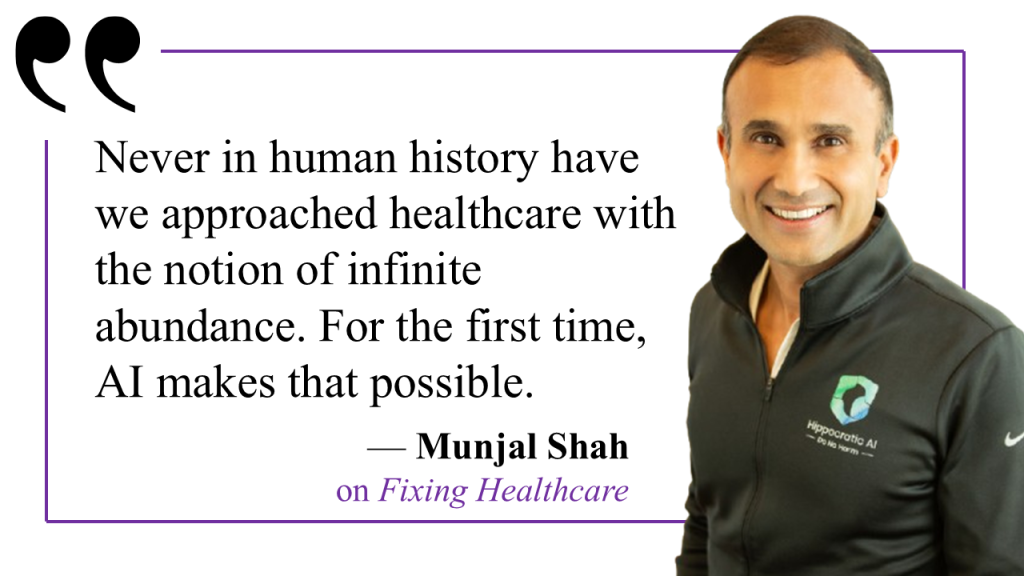Podcast: Play in new window | Download
Subscribe: Spotify | Email | RSS | More
In the latest episode of Fixing Healthcare, hosts Dr. Robert Pearl and Jeremy Corr welcome Munjal Shah, co-founder and CEO of Hippocratic AI, to explore how generative AI can help address one of the biggest challenges in healthcare today: the growing shortage of clinical workers.
Shah, a serial entrepreneur with a background in artificial intelligence, founded Hippocratic AI with an aim to build safe, scalable AI-powered healthcare agents that can assist with non-diagnostic patient care. In this interview, he shares his company’s progress in developing virtual solutions, lowering healthcare costs and expanding access to care.
This discussion is part of Fixing Healthcare’s Season 10, which examines how technology is reshaping medicine. Shah highlights three key insights on how AI can support healthcare professionals and improve patient outcomes:
1. AI-powered virtual Agents
Shah describes how Hippocratic AI is developing virtual agents that call patients, provide education and support chronic disease management—all at a fraction of the cost of human outreach. Unlike AI models designed for diagnostics or clinical documentation, Hippocratic focuses exclusively on non-prescriptive, patient-facing tasks within the scope of registered agents.
With AI-driven follow-ups, healthcare providers can now check in on all at-risk patients, not just the sickest 5-10%. Shah gives a powerful example of how missed blood pressure monitoring contributed to his mother’s heart failure—an outcome that AI-assisted outreach could have prevented.
2. Reducing healthcare costs while scaling patient support
One of the biggest challenges in healthcare today is the inability to scale preventive care and chronic disease management due to limited staffing. Shah reveals that Hippocratic’s AI-powered agents operate at a cost of just $9 per hour, which he says is a game-changer for health systems struggling with resource shortages.
He envisions AI agents making millions of proactive calls, reminding patients to take their medications, checking for early signs of complications and preventing avoidable ER visits. The technology could also be used in disaster response—calling patients at risk during heat waves, hurricanes or blackouts to coordinate medical assistance.
3. Safety, supervision & real-world testing with AI
Despite AI’s promise, Shah acknowledges that safety and accuracy remain top priorities. He explains how Hippocratic rigorously tests its models, using real nurses to evaluate and refine AI performance before deployment.
Unlike other AI tools that may hallucinate or provide misleading information, Hippocratic’s system is designed with 19 supervisory AI models to catch potential errors in real time. Shah argues that AI should complement, not replace, human clinicians—freeing them from administrative burdens so they can focus on hands-on patient care.
* * *
Fixing Healthcare is a co-production of Dr. Robert Pearl and Jeremy Corr. Subscribe to the show via Apple, Spotify, Stitcher or wherever you find podcasts. Join the conversation or suggest a guest by following the show on Twitter and LinkedIn.

